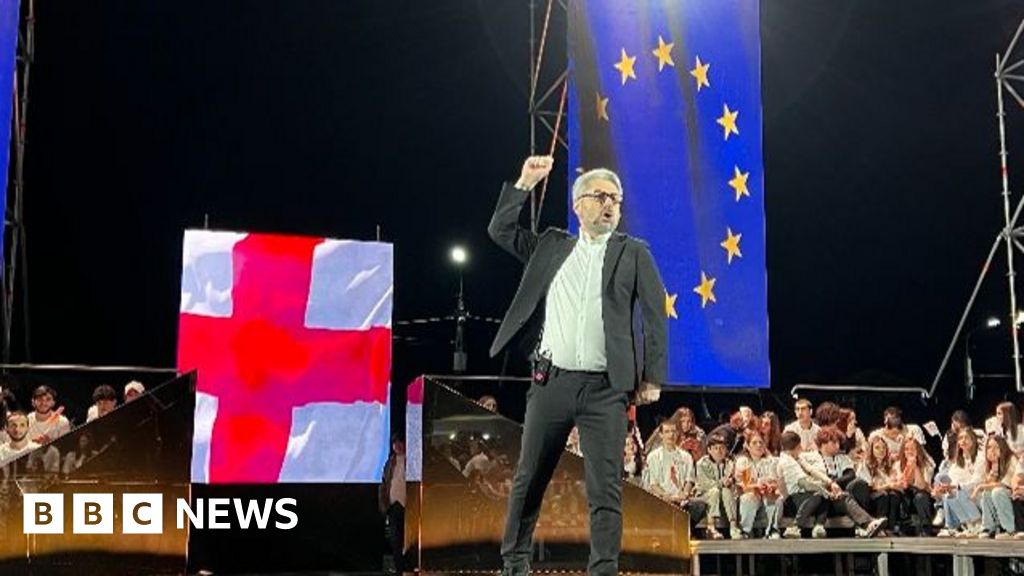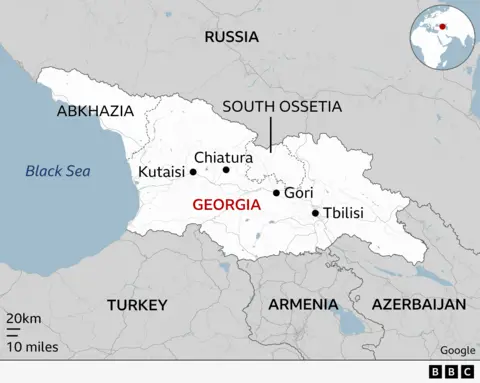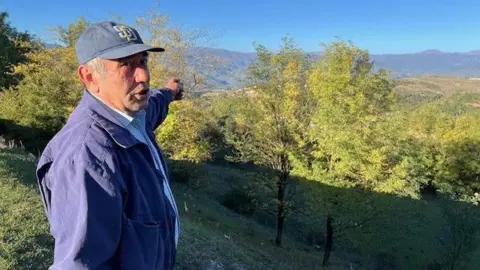Bussiness
Pivotal moment for Georgians with future in Europe at stake

 Georgian Dream party
Georgian Dream party“Choose peace not war” is the main message from Georgian Dream, the party that has been in power in Georgia for the past 12 years.
Russia’s war in Ukraine is featuring prominently in the governing party’s parliamentary election campaign, ahead of a decisive choice for Georgians on 26 October.
Billboards featuring images of bombed-out Ukrainian churches and swimming pools, burnt-out buses and school classrooms are contrasted with peaceful images from Georgia.
The implication is that the opposition will drag Georgia into a Ukraine-style war, while Georgian Dream can guarantee peace.
It is a powerful message in a country of 3.7 million people that borders Russia and suffered a short, but devastating conflict with its neighbour in 2008.
The real threat, says the country’s opposition, represented in the forthcoming elections by several pro-Western coalitions, is the loss of Georgian democracy along with a once-in-a-lifetime opportunity to join the European Union.

Georgia received candidate status to join the EU in December 2023, but the European Union has frozen the accession process due to increased anti-Western rhetoric by Georgian Dream and the passing of a controversial “foreign influence” law in June 2024.
It was a law that brought tens of thousands of young Georgian protesters onto the streets in the spring. The law requires media and civil society groups funded from abroad to register as acting in the interest of a foreign power. Protesters saw it as a threat to the country’s democracy and its future in Europe.
Critics say it was inspired by a Russian law used to crush dissent.
Georgia’s most powerful man, billionaire Bidzina Ivanishvili, has promised to outlaw opposition groups if Georgian Dream wins. He founded the party and is currently the honorary chairman.
He lumps all the opposition groups together as a collective United National Movement, or UNM, the name of Georgia’s largest opposition party.
“Today, the collective UNM supported from abroad is trying to come to power through unrest and get this country entangled in war and chaos,” Ivanishvili told supporters in Batumi on 10 October.
“This is to end once and for all. This is why Georgia needs the ruling party to win a constitutional majority in the 26 October elections.”
The risk of war and other “threats” feature prominently in pro-government media.
These include the idea that Europe wants to make Georgian men gay, or that an army of “foreign agents” from the country’s vibrant civil society and free media are part of a Western “Global War Party” conspiracy to foment revolution.

In the western city of Kutaisi, a crowd of several hundred supporters listen to Nika Gvaramia, from the opposition Coalition for Change, as he speaks from a stage backlit by EU and Georgian flags on flat screens.
“Our future is in Europe,” he cries.
His coalition aims to attract Georgia’s Gen Z voters – the very people who came out in big numbers to protest against the “foreign influence” law.
Leaving the stage, he told the BBC the parliamentary election was in essence a referendum on Georgia’s European future.
“There is no such thing as some kind of threat to peace in Georgia,” Gvaramia said. “That’s Russian propaganda. The main point of our agenda is how to survive. How to save our homeland. That is an issue of Russia or Europe.”
The opposition is hoping next week’s vote will bring in the first coalition government in Georgia and an end to what they describe as “one-party rule” by Georgian Dream.

But, with Bidzina Ivanishvili at its helm, Georgian Dream is confident it will secure a decisive victory.
“We have reached a historical maximum approval rating mainly due to two factors. The first is that despite challenges peace is ensured in our country. The second is quick economic growth over the past three to four years,” said Prime Minister Irakli Kobakhidze as he presented his party’s election programme on 7 October.
Critics instead point to the number of Georgians heading abroad in search of work. According to official statistics, 243,000 emigrated in 2023.
“If the economy is doing so incredibly well why are Georgians leaving the country?” asks Zviad Adzinbaia, a senior fellow at the Fletcher School of Law and Diplomacy at Tufts University.
The opposition has complained the authorities have not set up enough polling stations outside Georgia to accommodate their votes.
The Central Election Commission announced last month that it would open 60 polling stations in 42 countries.

The EU, US and UK have all spoken out against the direction Georgian Dream is pulling its country, with talk of democratic backsliding and narratives that serve only Russia.
On Tuesday, the UK froze its annual security dialogue with Georgia, with its ambassador to Tbilisi citing concerns about the decline of democracy and anti-Western rhetoric from the Georgian government.
The Kremlin insists it is not interfering in Georgia’s domestic affairs, arguing it is the West making “brazen attempts” to put pressure on the government.
Beyond the big cities, though, it is not geopolitics that pre-occupy many Georgians.
For months, Tamaz Neparidze, 66, and dozens of others from Shukruti protested outside parliament in Tbilisi, saying their village on a hillside above the town of Chiatura was collapsing because of a vast underground mine network.
They blamed the mining company and the government for their plight.
“I have lost all expectations. I don’t think I will vote in these elections I don’t believe in any of it,” said Tamaz.











